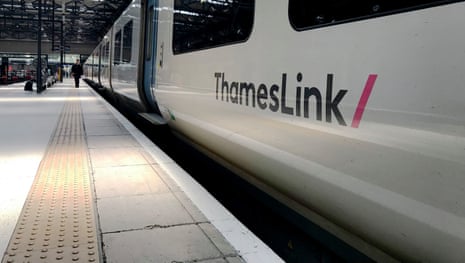Majority of trains under public control by next year, transport secretary to announce
Most rail journeys in Great Britain will be under public ownership by the middle of next year, the transport secretary is expected to announce.
Speaking at the Labour party’s annual party conference, Heidi Alexander will reveal the next four services to be brought into public ownership.
In her speech, Alexander is expected to say:
For too long our railways have been run in the interests of private profit, under a broken system that failed passengers over and over again.
This Labour government is calling time on 30 years of failure, frustration, fragmentation. We are returning our railways to the service of passengers.
In February next year, West Midlands Trains will become the next operator to transfer into public ownership.
And today I can go further, and announce that Govia Thameslink Railway, Chiltern Railways, and Great Western Railway will follow.
We said we would do it in our manifesto – and we are delivering on our promise.
West Midlands Trains services will transfer on 1 February 2026 and Govia Thameslink Railway’s services on 31 May 2026. Chiltern Railways and Great Western Railways (GWR) services will then be the next to transfer.

Govia Thameslink is the largest train operator in the country, meaning that by the middle of next year eight in ten services will be run by the public, for the public, say Labour.
Legislation to establish Great British Railways, the new organisation which will take responsibility for the day-to-day operations of the railways, will be introduced before the end of the year, the party has said.
More on this story in a moment, but first, here is what else is on the schedule today:
-
Morning: Children and families minister Josh MacAlister is on the morning media round.
-
11.30am: Keir Starmer will make a visit in central Liverpool as he heads to the city for his party’s conference.
-
12pm: Palestine Solidarity Campaign protest expected outside Labour party conference.
-
3.20pm: Chancellor Rachel Reeves will visit Southport.
-
Saturday: Close of constituency Labour party (CLP) and affiliate nominations for Labour deputy leadership candidates.
And some of the other recent developments in UK politics:
-
Keir Starmer will warn the Labour party that it is in a “fight for the soul of the nation” and that history will not forgive his government if it fails to confront and defeat Reform UK and the populist right. Speaking to the Guardian ahead of a vital conference for his leadership, he said he would tell disgruntled party members that now was “not the time for introspection” and infighting.
-
Starmer’s plan for digital IDs risks creating “an enormous hacking target”, a cybersecurity expert has warned, as technology companies prepared to bid for contracts that could run into billions of pounds. Amid widespread opposition, the prime minister said the mandatory digital ID – including citizens’ photos, names, dates of birth, nationalities and residency status – would come into use by July 2029. A petition calling for the government not to introduce digital ID cards had received more than 1.5 million signatures by Saturday morning.
-
Labour has restored the party whip John McDonnell and Apsana Begum 14 months after they lost it for rebelling over the two-child benefit cap, the Guardian understands. The pair had the whip reinstated after a conversation on Friday with Jonathan Reynolds, who became Labour’s chief whip in a reshuffle earlier this month.
-
Fears are growing that shared houses may become the focus of anti-migrant protests, with residents and charities saying tensions are building in some areas. Homes of multiple occupation (HMOs) have grown in number as renters seek affordable accommodation amid a housing crisis. Reform UK politicians, including George Finch, the teenage leader of Warwickshire county council, have criticised the use of HMOs to house asylum seekers.
Key events
Speaking to the Times, the chancellor said she wanted the Office for Budget Responsibility (OBR) to include the improved EU trading relationship brokered by Labour when it makes economic forecasts.
According to the PA news agency, she also told the newspaper the government wants “an ambitious youth experience scheme” to be scored by the OBR, as it would also be “good for the economy, good for growth and good for business”.
The scheme would allow young people from the UK to work, study and live on the continent, and vice versa, for an extended period of time.
While Reeves was keen to stress the economic benefits of the scheme, the Times suggested it could lead to a new migration headache for the government, as 50,000 Europeans a year could be eligible to live in the UK as a result of it.
Labour party chair Anna Turley has told the PA news agency she did not think “anyone would deny” that her party has had “quite a challenging couple of weeks” amid calls for Andy Burnham to challenge the prime minister.
But she insisted that many more MPs are “frustrated” that their colleagues are already trying to topple Starmer.
Keir Starmer to warn Labour that battle with Reform is ‘fight for soul of the nation’

Pippa Crerar
Keir Starmer will warn the Labour party that it is in a “fight for the soul of the nation” and that history will not forgive his government if it fails to confront and defeat Reform UK and the populist right.
Speaking to the Guardian ahead of a vital conference for his leadership, he said he would tell disgruntled party members that now was “not the time for introspection” and infighting.
His remarks are likely be seen as a veiled dig at Andy Burnham, the mayor of Greater Manchester, who has been touted by some as a potential successor.
The prime minister heads to Liverpool after a rocky few weeks marked by missteps and departures, and with Labour lagging 10 points behind Reform in the polls.
In his interview, Starmer urged his party to recognise the scale of the challenge ahead.
He said:
I have to say to all of those attending conference, this is a real opportunity for us to make our argument about patriotic national renewal, to own patriotism, to define it for what it is.
History will not forgive us if we do not use every ounce of our energy to fight Reform. There is an enemy. There is a project which is detrimental to our country. It actually goes against the grain of our history. It’s right there in plain sight in front of us. We have to win this battle.
While Starmer’s focus will be on setting out his own vision for renewing the country, he will also urge Labour not to be distracted by speculation over his grip on power.
Majority of trains under public control by next year, transport secretary to announce
Most rail journeys in Great Britain will be under public ownership by the middle of next year, the transport secretary is expected to announce.
Speaking at the Labour party’s annual party conference, Heidi Alexander will reveal the next four services to be brought into public ownership.
In her speech, Alexander is expected to say:
For too long our railways have been run in the interests of private profit, under a broken system that failed passengers over and over again.
This Labour government is calling time on 30 years of failure, frustration, fragmentation. We are returning our railways to the service of passengers.
In February next year, West Midlands Trains will become the next operator to transfer into public ownership.
And today I can go further, and announce that Govia Thameslink Railway, Chiltern Railways, and Great Western Railway will follow.
We said we would do it in our manifesto – and we are delivering on our promise.
West Midlands Trains services will transfer on 1 February 2026 and Govia Thameslink Railway’s services on 31 May 2026. Chiltern Railways and Great Western Railways (GWR) services will then be the next to transfer.
Govia Thameslink is the largest train operator in the country, meaning that by the middle of next year eight in ten services will be run by the public, for the public, say Labour.
Legislation to establish Great British Railways, the new organisation which will take responsibility for the day-to-day operations of the railways, will be introduced before the end of the year, the party has said.
More on this story in a moment, but first, here is what else is on the schedule today:
-
Morning: Children and families minister Josh MacAlister is on the morning media round.
-
11.30am: Keir Starmer will make a visit in central Liverpool as he heads to the city for his party’s conference.
-
12pm: Palestine Solidarity Campaign protest expected outside Labour party conference.
-
3.20pm: Chancellor Rachel Reeves will visit Southport.
-
Saturday: Close of constituency Labour party (CLP) and affiliate nominations for Labour deputy leadership candidates.
And some of the other recent developments in UK politics:
-
Keir Starmer will warn the Labour party that it is in a “fight for the soul of the nation” and that history will not forgive his government if it fails to confront and defeat Reform UK and the populist right. Speaking to the Guardian ahead of a vital conference for his leadership, he said he would tell disgruntled party members that now was “not the time for introspection” and infighting.
-
Starmer’s plan for digital IDs risks creating “an enormous hacking target”, a cybersecurity expert has warned, as technology companies prepared to bid for contracts that could run into billions of pounds. Amid widespread opposition, the prime minister said the mandatory digital ID – including citizens’ photos, names, dates of birth, nationalities and residency status – would come into use by July 2029. A petition calling for the government not to introduce digital ID cards had received more than 1.5 million signatures by Saturday morning.
-
Labour has restored the party whip John McDonnell and Apsana Begum 14 months after they lost it for rebelling over the two-child benefit cap, the Guardian understands. The pair had the whip reinstated after a conversation on Friday with Jonathan Reynolds, who became Labour’s chief whip in a reshuffle earlier this month.
-
Fears are growing that shared houses may become the focus of anti-migrant protests, with residents and charities saying tensions are building in some areas. Homes of multiple occupation (HMOs) have grown in number as renters seek affordable accommodation amid a housing crisis. Reform UK politicians, including George Finch, the teenage leader of Warwickshire county council, have criticised the use of HMOs to house asylum seekers.